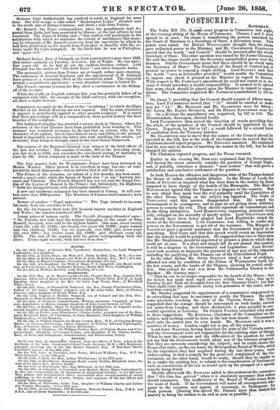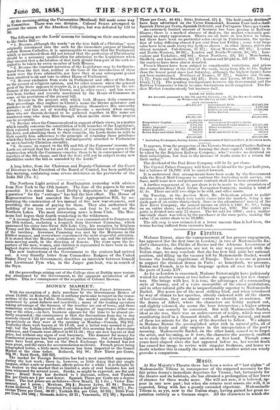POSTSCRIPT.
- - -- SATURDAY.
The India Bill (No. 3)Intsele some progress in Committee last night, at the evening sitting of the House of "Commons. Clauses 1 and 2 were agreed to at once. On clause 3, transferring the powers exercised by the Court of Directors to a Secretary of State, a discussion arose. Two points were raised. Sir HENRY WILLOUGHBY thought that the clause gave unlimited power to the Minister, and Mr. Crams:Fran Foam-tens moved that the words "and Council" should be inserted after the words Secretary of State. The other question was raised by Sir Jelin Groduti. He said the clause would give the Secretary uncontrolled power over the finances. Did the Government mean theft there should be no cheek upon the Secretary of State? The President of the Board of Control has at present no power to expend, single shilling. Lord STANLEY said that the words save as hereinafter provided" would enable the Committee to impose any check it pleased on the Minister in regard to finance. With respect to Mr. Fortescue's amendment he could not assent to it, be- cause it would introduce a double responsibility. It seemed to be agreed that some check should be placed upon the Minister in regard to expen- diture. The Committee negatived Mr. Fortescue's amandment by 221 to 77.
On clause 7, providing that the Council should consist of fifteen mem- bers, Lord Pmarnasrort moved that " 15 " should be omitted to make way for "12." Mr. MANGLES and Mr. GLADSTONE were for fifteen; Mr. Lows, Mr. DARBY SEYMOUR, and Sir HENRY KAWLDISON were for 12. On a division the amendment was negatived, by 227 to 165. The Ministerialists, thereupon, cheered loudly. Lord PALMERSTON then moved the insertion of words providing that the whole of the members of the Council should be appointed by the Crown. Negatived, by 240 to 147; a result followed by a second burst of exultation front the Treasury benches. Mr. GLADSTONE rose to move that the names of the Council should be inserted in the bill, but at the wish of the Committee he moved that the Chairman should report progress. Mr. DISRAELI assented. He explained that he was once in favour of inserting the names in the bill, but he had changed his opinion.
The Chairman reported progress, and the House resumed.
Earlier in the evening Mr. DISHAEI1 explained that the Government will during the recess earnestly consider the question of Tenant Right, and, if possible, introduce a measure "next session" that will prove a satisfactory and conclusive settlement of the question.
In both Houses the offensive and dangerous state of the Thames formed the theme of rather considerable debates. In the House of Lords the Duke of BUCCLEUCH inquired what has been done in the matter by those supposed to have charge of the health of the Metropolis. The Earl of MALMFSBURY agreed that the Thames is a disgrace to the country. But he was afraid they must bear the evil patiently until the Committee of the other House sitting on the subject hats reported. The Duke of NEWCASTLE said this answer disappointed him. He urged the Government to be courageous, and to pass an act giving them arbitrary powers to remedy the evil. They should supersede all commissions and do the thing themselves. Lord HARDWICK; expressing personal views only, enlarged on the necessity of speedy action. Lord Giterevn.LE said, he should have been better pleased had Lord Hardwicke stated the views of the Government. lord CAMPBELL was willing to confer any powers on the Government to get rid of the nuisance. The Marquis of SALISBURY gave a general assurance that the Government hoped to do something. Earl GREY said that this speech would create an impression that the remedy would be postponed. He suggested that two or three men like Mr. Stephenson, should be appointed to prepare a plan on which they could act at once. If a short and simple bill be not passed this session, it will be a disgrace to the Government and Legislature. Lord Ricers- DALE took occasion to deprecate the payment of any part of the expenses attending the purifying of the Thames out of the Consolidated Fund. In the other House Mr. OWEN STANLEY cited a host of evidence, afforded not only by condition of the Palace of Westminster itself, but the law courts, and the banks of the Thames, showing its putrid condi- tion. One extract he read was from Mr. Goldsworthy Gurney to the Speaker. Mr. Gurney says- " That he can be no longer responsible for the health of the House ; that the stench has made most rapid advance within two days; that up to Tuesday he got fresh air draughts from the Star Chamber Court; but that when night came the poisonous enemy took possession of the court, and Pa beat him outright." Mr. Stanley suggested the appointment of a commission empowered to do everything that may be necessary to purify the Thames. He asked some questions touching the state of the Victoria Sewer. Mr. TITE suggested that the sewage should be intercepted on both banks, carried ten miles from London, and there deodorized ; a plan actually in suc- cessful operation at Leicester. Sir JOSEPH Pexrere coincided very much in these suggestions. Mr. KENDALL, Chairman of the Committee on the subject, said nothing could be done as the law now stands. Government must take the matter into its own hands. Mr. MANGLES said it was a question of money. London ought not to pay all the expense. Lord JOHN Mammas, having described the state of the Victoria sewer, said the Government were not responsible for the existing state of things. When he saw the expense and the difficulties of the question he could not say that the Government would adopt any of the schemes proposed. But they are seriously considering the subject; and he could assure the House that while, on the one hand, the Metropolitan Board of Works, aided by the experience they had acquired during the last three years, were endeavouring to find a remedy for the great evil complained of, the Go- vernment, on the other hand, would be ready, should they be unable to do so under the existing law, to submit to the consideration of Parliament such an emendation of the law as would open up the prospect of a speed9 remedy being found. Shortly afterwards Mr. Diens= added to this statement the assurance that "the time has arrived" when it is absolutely necessary that action should commence. The inefficiency of the Board of Works arises from the want of funds. If the Government will make all arrangements ade- quate to the occasion, and appeal, if necessary, to Parliament for fresh powers. [During this speech Mr. Disraeli more than hinted his anxiety to bring the session to an end as soon as possible.]
At the morningsitting the Universities telaat(and) Bill made some way in Committee. There was ono division. Colonel SvicEs attempted to prevent the union of the Aberdeen Colleges, but was defeated by 125 to 90.
The following are the Lords' reason:1 for insisting on their amendments to the Oaths Bill-
" 1. Because, although the words ' on the true faith of a Christian ' were originally introduced into the oath for the immediate purpose of binding vertaiu Roman Catholics, it is nureasonable to assume that the Parliament which so introduced them did not intend that the profession of Christianity should be a necessary qualification for admission to the Legislature when they enacted that a declaration of that faith Ould form part of the oath re- quired to be taken by every member of both'Houses. "2. Because the constant intention of the Legislature may be further in- ferred from the fact that, neither at the time of the introduction of these words were the Jews admissible, nor have they at any subsequent period been admitted to sit and vote in either House of Parliament.
3. Because exclusion from seats in Parliament and offices of the State on the ground of religious opinion, and for other reasons when the general good of the State appears to require it, is a principle recognized in the set- tlement of the succession to the Crown, and in other cases ; and has more- over been further and recently sanctioned by the House of Commons in some of the provisions of the present bill. "4. Because in the prayers with which both Houses daily commence their proceedings they implore in Christ's name the Divine assistance and guidance in all their undertakings, professing themselves His unworthy servants ; and this act of worship will become a mockery when among those who are therein declared to be gathered together in His name are numbered some who deny Him through whose merits alone those prayers can be acceptable. "5. Because when the Commons plead in support of their views, in a matter which equally concerns the constitution of both branches of the Legislature, their repeated recognition of the expediency of removing this disability of the Jews, and admitting them to their councils, the Lords desire to refer to their equally firm adherence to the principle of retaining those privileges which they believe to be peculiarly and inseparably attached to Parliament as an exclusively Christian assembly. "6. Because, in regard to the 8th and 9th of the Commons' reasons, the Lords are advised that the 1st and 3d clauses of the bill are not open to the construction which the Commons conceive them to be in consequence of the rejection of the 5th clause, and that the Jews will not be subject to any new disabilities snider the bill as amended by the Lords."
A long letter, from the Chairman and Deputy-Chairman of the Court of Directors to the President of the Board of Control, has been published this morning, containing some severe strictures on the provisions of the India Bill (No. 3.) The Northern Light arrived at Southampton yesterday with advices from New York to the 12th instant. The tone of the papers is far more peaceful. It is stated that Lord Derby's disposition to make "ample reparation" for the "outrages" has had the best effect. The House of Representatives had amended the Naval Appropriation Bill, by au- thorizing the construction of ten instead of five new war-steamers, and providing the means of paying for them. They also authorized the building of ten iron screw gun-boats, and four to be used on the Northern Lakes. The most interesting news is from Utah. The Mor- mons had begun their fourth wandering in the wilderness.
"A message from President Buchanan was communicated to Congress on the 10th instant, enclosing a despatch from Governor Cumming, which announced his entry into Great Salt Lake City, his reception by Brigham Young and the Mormons, and his formal installation into the Governorship of the territory. Governor Cumming was met by the Mormons lathe thiclest manner' and everywhere experienced the most respectful attention. It is stated that the Mormon settlements were broken up, and the inhabi- tants moving south, in the direction of Sonora. The scene upon the de- parture of the men, women, and children is represented to have been in the highest degree distressing and mournful."
The new instructions of the Government to the cruisers had arrived out. A very friendly letter from Commodore Rodgers of the United States Navy to his Government, describes an interview between himself and Lieutenant Pym who, in the Jasper gun-boat, was in search of the Styx. [i All the proceedings arising out of the College riots at Dublin were yester- day abandoned by the Government, to the apparent satisfaction of all parties. This is a consequence of the acquittal of Colonel Browne.



























 Previous page
Previous page